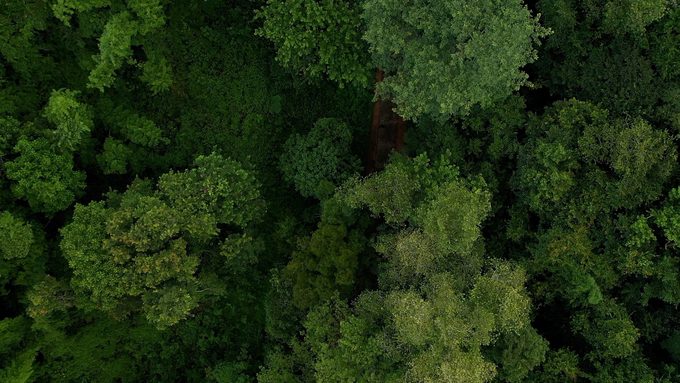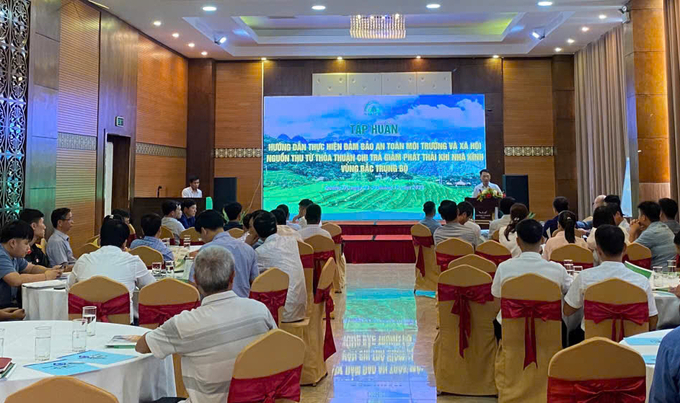June 6, 2025 | 14:18 GMT +7
June 6, 2025 | 14:18 GMT +7
Hotline: 0913.378.918
June 6, 2025 | 14:18 GMT +7
Hotline: 0913.378.918
The International Bank for Reconstruction and Development, a fiduciary of the Forest Carbon Partnership Facility (FCPF) under the World Bank (WB), and the Ministry of Agriculture and Rural Development (MARD) executed ERPA.
According to this agreement, FCPF will provide Vietnam with USD 51.5 million if forestry-related activities result in a reduction of 10.3 million tons of CO2 equivalent (CO2e) from natural forests in the North-Central region between 2018 and 2024. Vietnam achieved an impressive reduction of 16.2 million tons of CO2e during the initial reporting phase (2018–2019), surpassing the target.

Under the ERPA agreement, the Forest Carbon Partnership Fund (FCPF) will pay Vietnam USD 51.5 million if forestry-related activities reduce 10.3 million tonnes of CO2 equivalent (CO2e) from natural forests in the North Central region during the 2018-2024 period. Photo: Ngoc Diep.
It is anticipated that the payment sources from the program will provide substantial benefits to more than 1,100 communities in six provinces, benefiting over 68,000 forest owners who have thoroughly protected natural forests since 2018. These funds will assist forest proprietors and communities residing close to forests to support activities that directly contribute to the reduction of greenhouse gas emissions, including the preservation of natural forests, the implementation of forestry measures, and the promotion of livelihood development initiatives.
Examples include the provision of plant and animal reproductive resources, agricultural and forestry extension services, and community infrastructure initiatives. These measures are consistent with Decree 107/2022/ND-CP, which was issued by the government on December 28, 2022. This decree regulates the pilot transfer of emission reduction results and financial management for the ERPA.
The program primarily produces substantial positive environmental and social effects. It enhances the multifunctional value of forests and expands the protected forest area in an environmentally friendly manner. Socially, it directly benefits indigent populations in disadvantaged regions, as well as ethnic minority communities that reside close to and rely on forests.
The program ensures the early identification and evaluation of impacts on ecosystems, human health, and cultural resources following WB's environmental and social safeguard policies. It is necessary to mitigate or minimize the unavoidable adverse effects, in addition to providing stakeholders with appropriate details in a timely manner.
Vietnam met the World Bank's requirements during the program's preparation phase under the Vietnam REDD+ Readiness Project by preparing critical documents, such as the Strategic Environmental and Social Assessment (SESA), the Environmental and Social Management Framework (ESMF), the Ethnic Minority Planning Framework (EMPF), the Process Framework (PF), and the Gender Action Plan (GAP). Furthermore, local stakeholders, including ethnic minority communities that depend on forests, were consulted and benefit-sharing mechanisms, grievance redress mechanisms (GRM), and other related program frameworks were developed.
In order to guarantee environmental and social safety, stakeholders were consulted and a Program Operations Manual (POM) was developed during the implementation process. This manual provided specific guidelines. Forest proprietors are required to conduct environmental and social impact screenings of proposed activities prior to their implementation, with the supervision and assistance of provincial Forest Protection and Development Funds. These measures guarantee that activities do not harm the environment or society, while simultaneously achieving community support.

In October 2024, the Vietnam Forest Protection and Development Fund organized two training courses on “Guidelines for ensuring environmental and social safety of revenue from ERPA” with the participation of representatives from six localities in the North Central region. Photo: Ngoc Diep.
Additionally, Vietnam implemented a grievance redress mechanism (FGRM) that relied on the country's existing frameworks. We will conduct periodic monitoring, evaluation, and reporting during the implementation process to promptly address complaints and minimize adverse impacts.
The Vietnam Forest Protection and Development Fund conducted two training sessions in October 2024 that focused on the "Guidelines for Ensuring Environmental and Social Safeguards for ERPA Revenues." The ERPA beneficiaries, specifically forest proprietors, local government representatives, and organizations responsible for administering natural forests in six North-Central provinces, were the focus of the training. To guarantee the program's success and adherence to FCPF/WB commitments, more than 200 participants convened to deliberate on grievance mechanisms and safeguard measures.
"Safeguards" are measures that are intended to prevent or mitigate adverse effects during the development process, thereby safeguarding against environmental and/or social damage. These policies or regulations necessitate the assessment of environmental and/or social concerns in the decision-making process, the mitigation of risks, and the establishment of mechanisms for information disclosure and consultation. Vietnam is well-positioned to fulfill its obligations under the ERPA and contribute to global efforts to mitigate climate change by adhering to these safeguards.
Translated by Linh Linh

(VAN) VAAS and numerous Vietnamese enterprises have signed cooperation agreements with Japanese partners to promote agricultural technology and trade connectivity.
/2025/05/29/5625-12-214801_567.jpg)
(VAN) Provincial mergers in the Mekong Delta promise to streamline administration, expand inter-provincial raw material areas, and foster close linkages in agricultural value chains, benefiting both businesses and cooperatives.

(VAN) Merging Mekong Delta provinces contributes to the expansion of agricultural raw material areas, addressing previous constraints caused by provincial boundaries. Additionally, this expansion will reduce costs and strengthen linkages between businesses, cooperatives, and farmers.
/2025/05/29/1043-2-153730_145.jpg)
(VAN) The Government's policy to merge provincial-level administrative units opens up major opportunities for the Mekong Delta region to reshape its agricultural development strategy toward large-scale production, effective regional linkages, and sustainability.

(VAN) The mutual export of agrifood products between the European Union (EU) and the United Kingdom (UK) must occur again without certification, border controls or other red tape. This was agreed at the UK-EU summit.
/2025/05/22/5121-2-173645_677.jpg)
(VAN) NBSAP Tracker identifies strengths and areas for improvement in the National Biodiversity Strategy, based on each region’s priorities and capacities.

(VAN) The draft amendment to the Circular on rice export trading stipulates a periodic reporting regime for rice exporting enterprises.